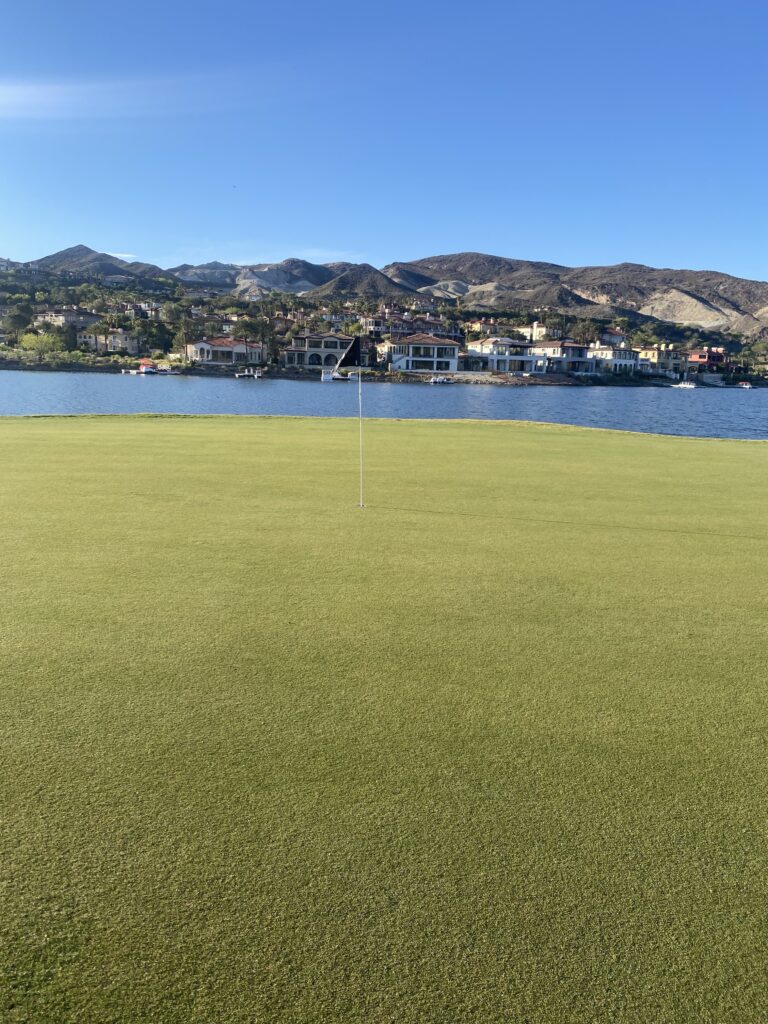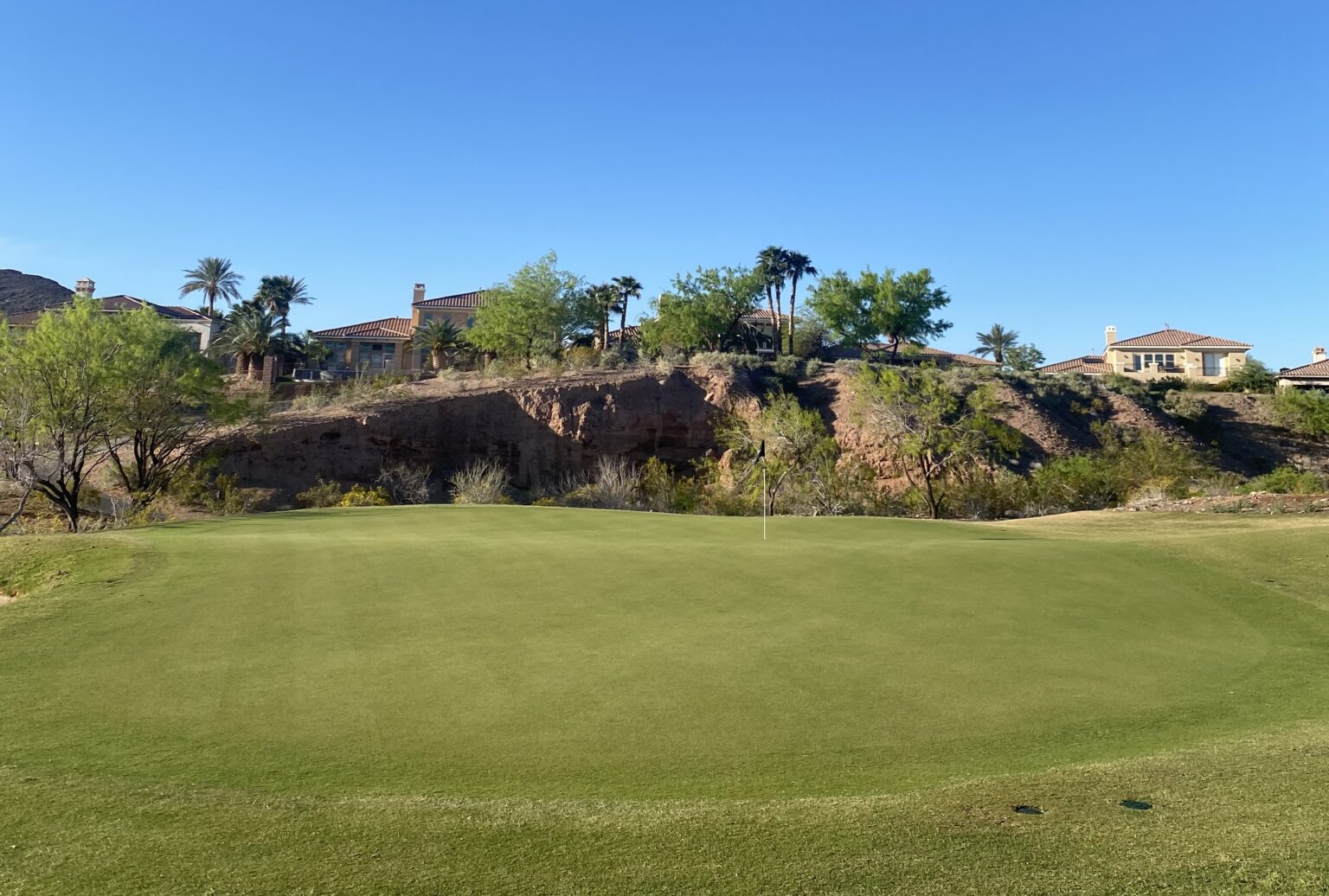Platinum TE Pays Off for Reflection Bay Golf Club
As water quantity and quality in the western United States continue to pose challenges, maintaining less sustainable turfgrasses becomes a gamble. When Reflection Bay Golf Club in Henderson, Nevada, began to have more bad years than good with its bentgrass greens, it was time to place its bets on Platinum TE Paspalum.
Reflection Bay is an iconic 18-hole golf course located on the shores of Lake Las Vegas, boasting the prestigious title of being the only Jack Nicklaus Signature Course in Nevada. Established in 1998, Reflection Bay has consistently ranked as one of the top courses in Southern Nevada, attracting a high volume of golf enthusiasts with an average of 32,000 to 35,000 rounds of play per year.
In a recent endeavor to enhance its playing conditions and sustainability, Reflection Bay embarked on a significant project to convert its bentgrass greens to the salt tolerant Platinum TE Paspalum turfgrass. The decision to transition to Platinum TE was driven by the challenging environmental conditions faced by the golf course, particularly the hot and humid summers with limited rainfall, as well as the poor water quality derived from the manmade Lake Las Vegas, which receives raw water supply from the Colorado River.
International Golf Maintenance (IGM) oversees the course, and its regional manager, Jonathan Dodds, played an integral role in the decision to change the turfgrass at Reflection Bay. Dodds has worked in the golf course maintenance field for almost thirty years. With IGM, he oversees golf courses in California, Arizona, and Nevada.
Following five years of closure due to the economic downturn, the golf course was purchased and reopened in 2015. However, the ongoing struggle to maintain bentgrass greens in the arid and saline conditions prompted the need for a turfgrass that could thrive in such an environment. Water coming into the lake has an average salt content of 700 ppm, and after evaporation, the counts in the stagnant lake can reach 1800 to 2000 ppm. Drought and the resulting water restrictions only increase the problem.
“So we were left with the decision,” said Dodds. “Do we continue to try to maintain bentgrass greens, or do we switch to bermudagrass or paspalum? Knowing that salt would likely be one of our biggest concerns going forward, we ruled out bermudagrass.”
Dodds and Reflection Bay golf course superintendent Noel Villarreal weighed their options and determined that transitioning to a salt tolerant turfgrass like Platinum TE Paspalum would be the most viable solution.
While neither Dodds nor Villarreal had managed paspalum before, they did their homework. The decision was influenced by the success of Platinum TE at a neighboring golf course, The Club at Sunrise in Las Vegas, which has been very successful despite poor water quality. In addition, IGM had experience with Platinum TE at Lajitas Golf Resort in South Texas. Consultations with Dr. Ron Duncan, the developer of Platinum TE Paspalum, further reassured the team at Reflection Bay of the suitability of this turfgrass for their specific conditions.
“I’ve been in the desert my whole career. Based on what I knew about paspalum and our conditions, I felt that Platinum TE was the perfect grass for our situation.”
Jonathan Dodds, Regional Manager at International Golf Maintenance
“I’ve been in the desert my whole career,” said Dodds. “Based on what I knew about paspalum and our conditions, I felt that Platinum TE was the perfect grass for our situation.”
Villarreal concurred. “I think Lake Las Vegas has the perfect environmental conditions for paspalum grass to grow healthy.”
Conversations about converting escalated after a particularly hot and humid summer in 2022.
“We had some serious issues that year and ended up losing some of the turf,” said Dodds. “That’s really what got the ball rolling.”
The process began with a testing phase at a nearby golf school that IGM manages. Besides just replacing the turfgrass, Dodds and Villarreal had an additional goal for the project. The greens at Reflection Bay had structural issues due to large amounts of silt in the water that restricted water flow. Using the greens cavities at the golf school, the team conducted two trials replicating the rebuilding process of the greens to take place at Reflection Bay, where they would remove the contaminated soil, rebuild, and regrass. Work on the test greens mimicked the plans for Reflection Bay precisely but with two different sprigging rates to explore grow-in times.
With data from the trials, the turfgrass conversion at Reflection Bay began in May 2023 with plans to close the course after Memorial Day weekend and reopen on September 10th.
“I think Lake Las Vegas has the perfect environmental conditions for paspalum grass to grow healthy.”
Noel Villarreal, Golf Course Superintendent at Reflection Bay
“Based on our tight timeframe, we decided we didn’t want to risk the sprigs not filling in completely and the greens not being ready to open,” said Dodds. “So, instead of sprigging, we pivoted and sodded all the greens at Reflection Bay.”
The team took meticulous steps during the conversion process. They stripped the existing grass, fumigated, removed the contaminated soil layers, added four inches of sand and amendments, rototilled, and conducted a final float.
With the greens ready to plant, Platinum TE licensed grower West Coast Turf took over. Sourced from their Escondido farm, the Platinum TE arrived in big sod rolls, which West Coast Turf installed in early July.
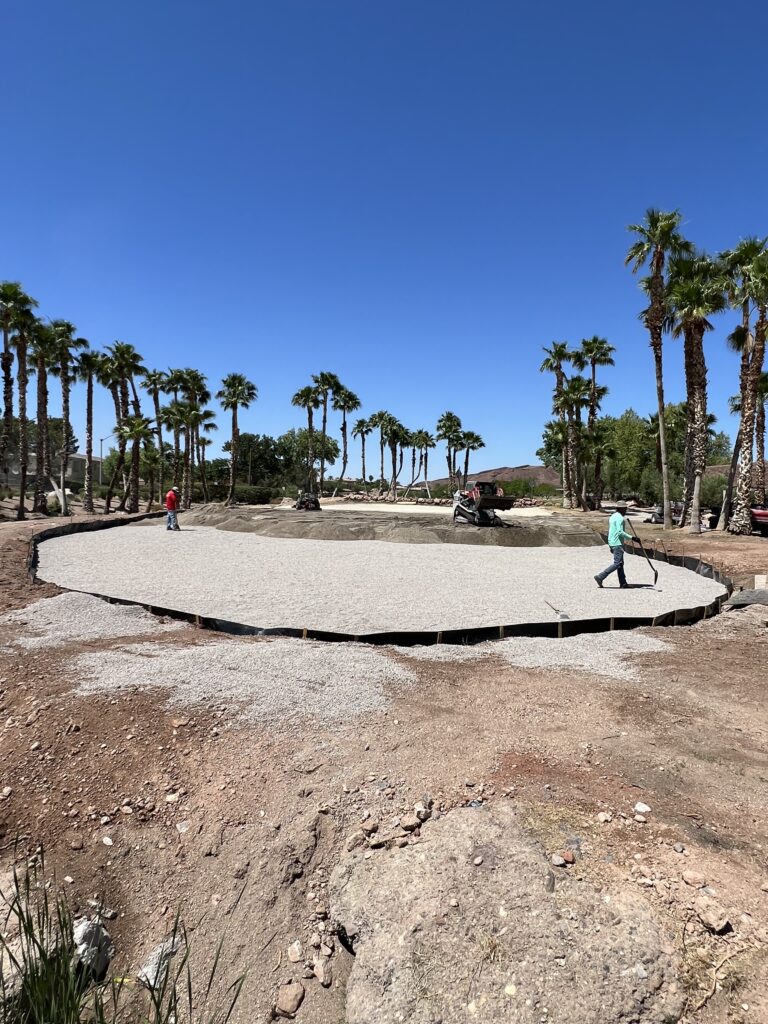
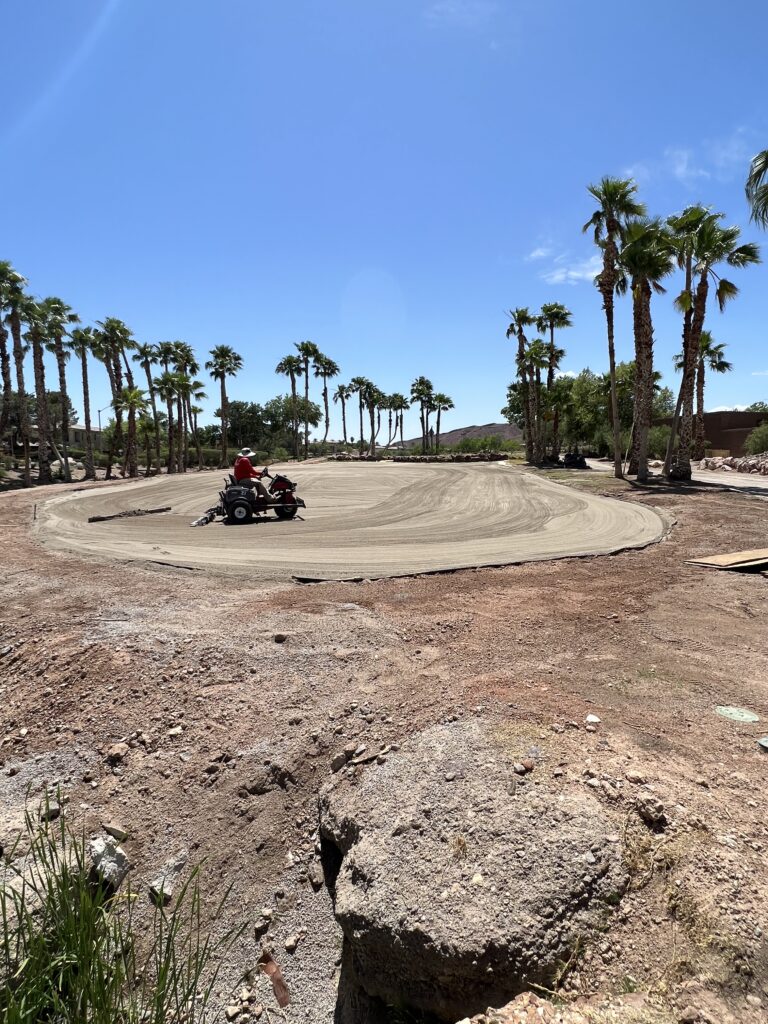
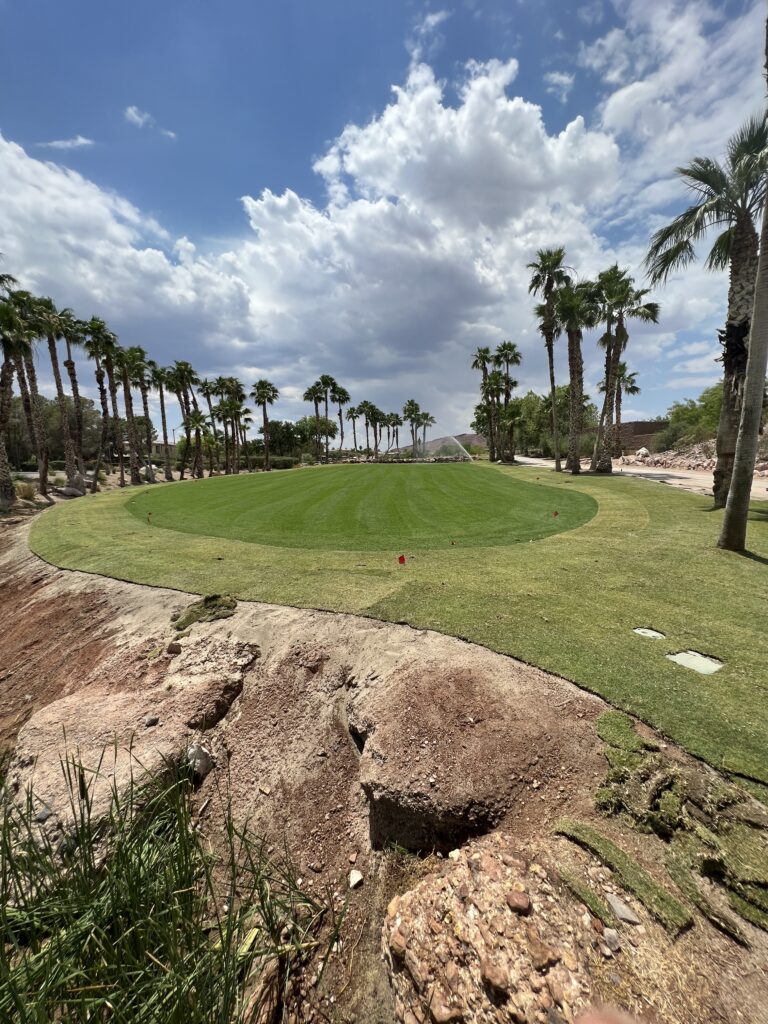
To meet their reopening deadline in mid-September, the team needed to lower the mowing heights rapidly.
“We did three different core aerifications and literally buried the greens in sand to try to bring the level of the ground up and the height of the mowers down at the same time,” said Dodds. “It was a little rough on the mowers, cutting all the sand every time we mowed. When we opened, we were at a height of cut of .125 inches. We were shooting for at least .135 so we met that goal and our time deadline. By the middle of October, we were down to .100 on the height of cut.”
The general manager at Reflection Bay, Jon Openshaw, shared goals for the greens conversion from bentgrass to Platinum TE Paspalum with the membership. The goals included water savings, wear resistance, disease resistance, reduced chemical usage, and an overall exceptional golfing environment. After completing a full year with the new greens, Dodds and Villarreal will calculate the specific results for the measurable goals. Still, so far, Platinum TE is proving to be the right choice. Insights on how the new turfgrass has fared based on their initial goals and expectations look quite favorable.
“We can comfortably say we have saved water based on the amount put out,” said Dodds. “The biggest savings will come in the summer when we are not constantly having to syringe and keep bentgrass cool during 118-degree temperatures.”
The wear resistance of the Platinum TE greens is significant enough that they are increasing the target rounds played from 35,000 to 40,000 or even 45,000 per year.
“What I like most about the greens so far is that they are very resistant to ball marks. It is hard to find a ball mark anywhere on the greens.”
Noel Villarreal, Golf Course Superintendent at Reflection Bay
“What I like most about the greens so far,” said Villarreal, “is that they are very resistant to ball marks. It is hard to find a ball mark anywhere on the greens.”
“The reduction in wear has been remarkable, even under high traffic conditions,” said Dodds. “When we reopened in September, we probably saw 180 to 200 golfers per day for the first two months before the weather got colder. You could not see one ballmark.”
In terms of greens speeds, the transition to Platinum Paspalum has been smooth, with Dodds expressing satisfaction with the consistent speeds achieved without excessive effort. This aspect is particularly important to Reflection Bay members and guests, as competitive golf courses in the area traditionally feature bentgrass greens.
Regarding chemical usage, Dodds says that the impact will be more evident after an entire summer season. “That’s when our bentgrass would really take a lot of chemical applications for the humidity and the heat.”
Visually, the appearance of the Platinum TE Paspalum greens has garnered praise from members and guests alike. “We did go dormant this winter,” said Dodds, “but by early February, you could see the Platinum TE getting greener and waking up daily. Within ten days, it went from dormant to fully green again.”
Feedback from golfers, including Dodds himself, has been overwhelmingly positive. Players have lauded the true roll and consistency of the Platinum TE greens, noting the similarity to bentgrass greens in terms of playability.
“Everybody has been very pleased with the change to Platinum TE,” said Dodds. “I’ve played twice so far, and I made six birdies each time. From a player’s standpoint, I couldn’t be happier, and I’ve played a lot of high-end facilities.”
From a superintendent’s perspective, managing paspalum has been a smooth transition, with the turfgrass exhibiting exceptional adaptability and root development.
“The amount of roots and root density is shocking,” said Dodds. “We have roots below our cup cutter when we cut the cups. We had roots nine to ten inches deep in the middle of winter when the Platinum TE was dormant. I have pictures three weeks after the sod went down with six- to seven-inch long roots already.”
“The amount of roots and root density is shocking. We have roots below our cup cutter when we cut the cups.”
Jonathan Dodds, Regional Manager at International Golf Maintenance
Looking ahead to the future of golf in the Western U.S., Dodds foresees a shift towards more sustainable turf management practices, especially in regions facing water scarcity and poor water quality. With ongoing water restrictions and a growing awareness of the need for water-efficient turfgrasses, courses like Reflection Bay are setting a precedent by adopting drought-tolerant varieties like Platinum TE Paspalum.
Dodds envisions a trend of course renovations opting for turfgrasses that require less water and are better equipped to thrive in challenging environmental conditions, aligning with the broader goal of enhancing water conservation efforts within the golf industry.
“I believe the future of golf here will be courses reducing the amount of maintained turf as well as selecting more drought and salt tolerant turfgrasses like Platinum TE when they renovate. For us, the decision was a good one.”
